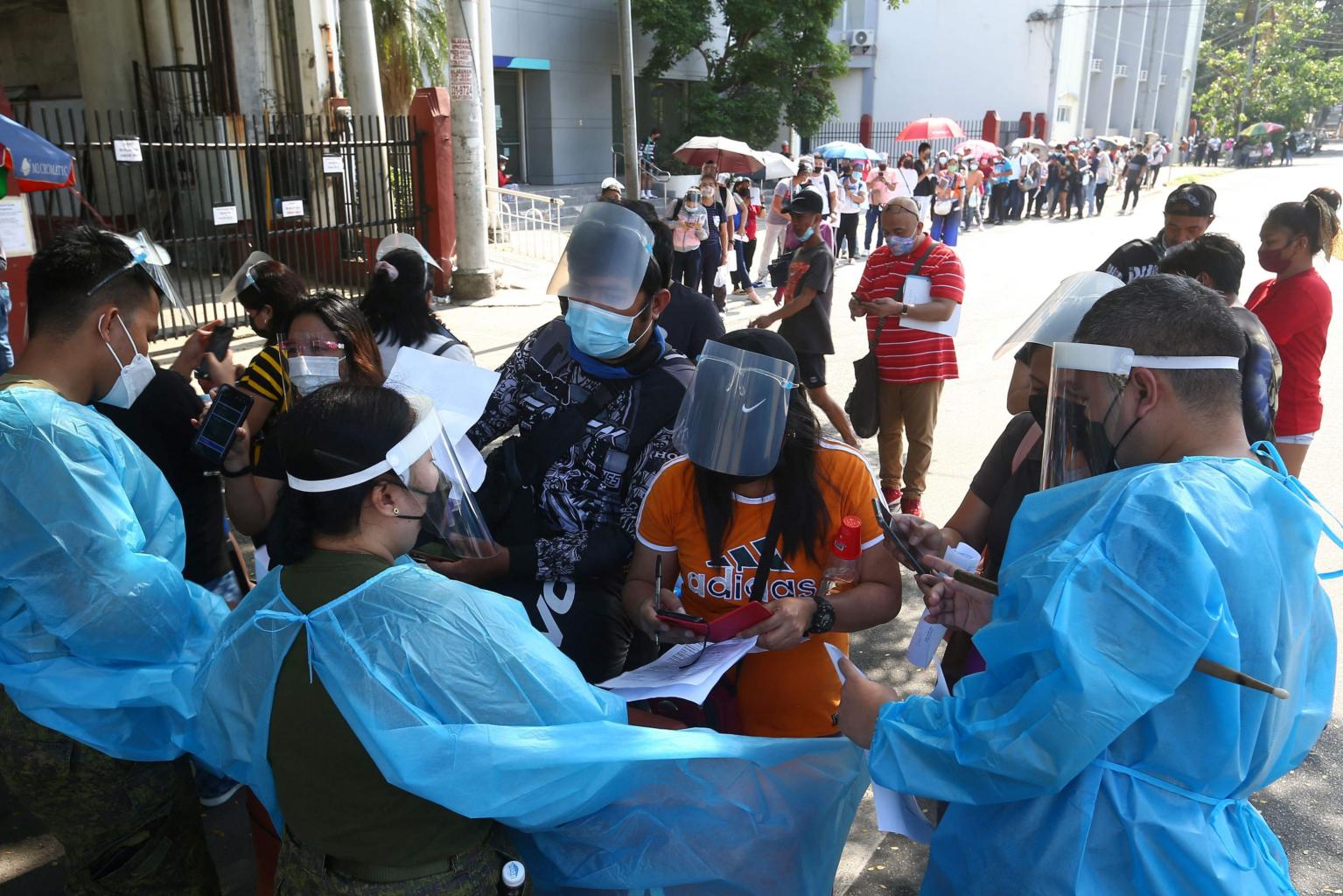Philippines records highest daily number of Covid-19 infections as Omicron runs rampant
Sign up now: Get insights on Asia's fast-moving developments

People queueing to be swabbed for Covid-19 in Manila on Jan 7, 2022.
PHOTO: AFP
Follow topic:
MANILA - The Philippines has tallied its highest daily number of Covid-19 infections since the start of the pandemic, just two weeks after recording fewer than 200 cases a day.
The Health Ministry reported 26,458 cases on Saturday (Jan 8) as the extremely infectious Omicron variant rages throughout the country.
That topped the previous high of 26,303, recorded on Sept 11 last year during the peak of a deadly surge caused by the Delta variant.
The number of active cases, meanwhile, has soared to 102,017. The last time the number was this high was on Oct 9 last year, when the country had over 106,000 active cases.
The government has already placed Metro Manila and dozens of other cities and provinces on the third-highest level of alert till Jan 15.
Restaurants, amusement parks, tourist attractions, beauty salons and fitness studios are now operating at lower capacity.
In-person classes, contact sports, funfairs and casinos have been suspended, while localised lockdowns targeting specific buildings, streets and neighbourhoods would also be enforced.
Churches have been shut.
But policymakers are still reluctant to further tighten mobility curbs, as they try to revive a battered economy without overwhelming already stretched out and resource-poor hospitals.
Dr Rontgente Solante, an infectious disease expert, said moving to a higher alert level might soon be necessary.
"With the enormous number of people (testing) positive within just a short duration of time… and with hospitals now (seeing higher Covid-19 admissions) and (experiencing) staff shortage, we need a higher alert level than we have now," he said.
The highly transmissible Omicron variant has been fuelling an explosive growth in cases over the past two weeks.
Health Undersecretary Maria Rosario Vergeire said cases were doubling every 2.2 days, suggesting that Omicron was five to six times more transmissible.
The positivity rate has surpassed 40 per cent. This means nearly one in two of those being tested are returning positive results.
The reproduction number, which measures how fast a virus is spreading, has soared to 5.69. The acceptable level is 1.
Despite over 90 per cent of its population of over 13 million getting one dose of a vaccine, Metro Manila has been the hardest hit by the current outbreak. This urban sprawl of 16 cities has been accounting for three out of every five new cases.
The Philippines has the second-worst Covid-19 outbreak in South-east Asia, after Indonesia, with close to three million cases and some 50,000 deaths,.
Health officials are betting that with a new round of health rules and with studies showing that Omicron causes only mild symptoms, hospitals will not be overwhelmed as in previous surges.

The government's Covid-19 task force has shortened the isolation period for health workers who test positive to just five days, so they can return to their posts quickly.
Hospitals, meanwhile, have been turning away those showing up with just mild or moderate symptoms.
"As long as we are able to keep our healthcare workforce healthy and everyone cooperates, we can minimise deaths and hospitalisation in four weeks," said Dr Edsel Salvana, an adviser to the Health Ministry.
He added that the high vaccination rate in Metro Manila meant there was "a fighting chance".
Some of the biggest hospitals in Metro Manila, though, are already seeing a spike in admissions.
Half of intensive care, isolation and ward beds for Covid-19 patients in the area are already occupied.
The Philippine General Hospital, the country's largest state-run hospital, said its Covid-19 intensive care section was already full.
It also reported that half of the more than 200 Covid-19 patients were vaccinated.
Dr Salvana cautioned against treating Omicron as a mild variant.
"Omicron is a virus. It is not a vaccine… The risk is not zero," he said.

